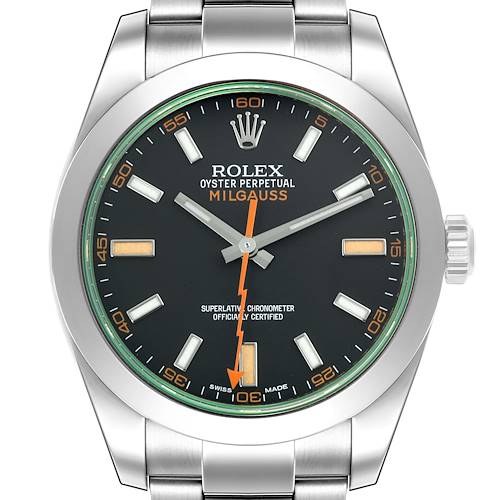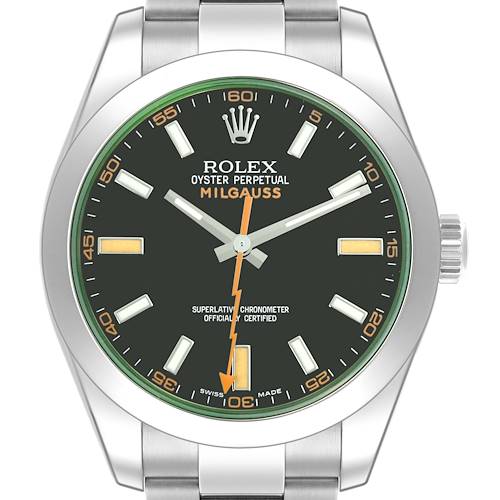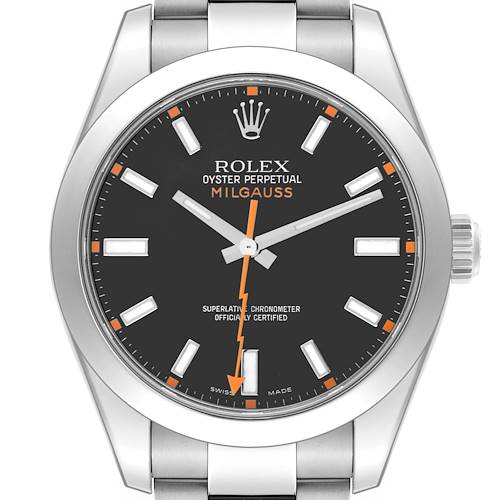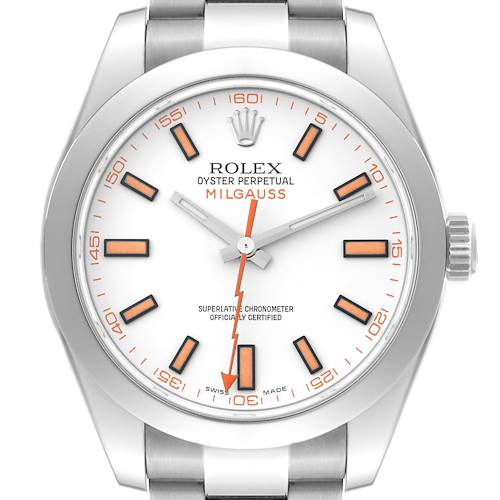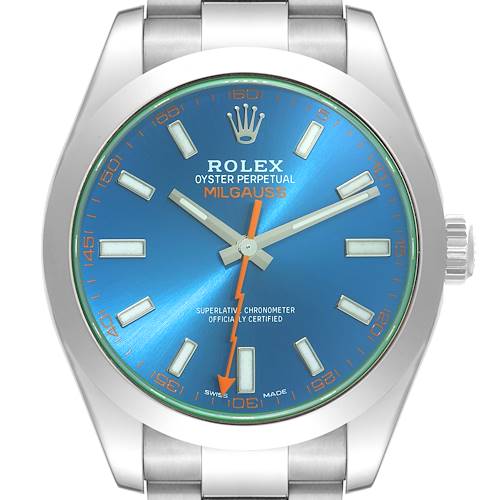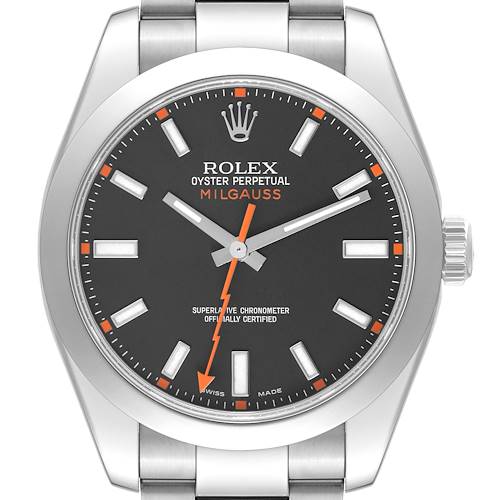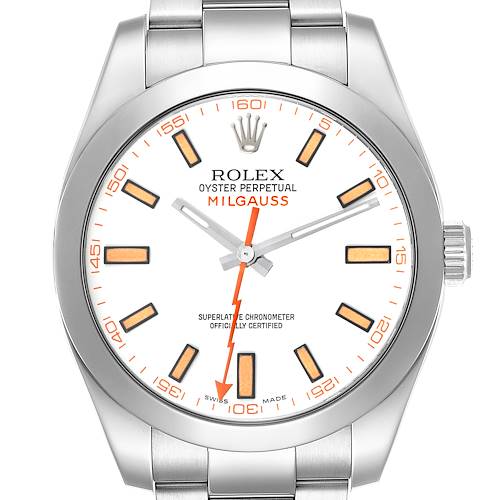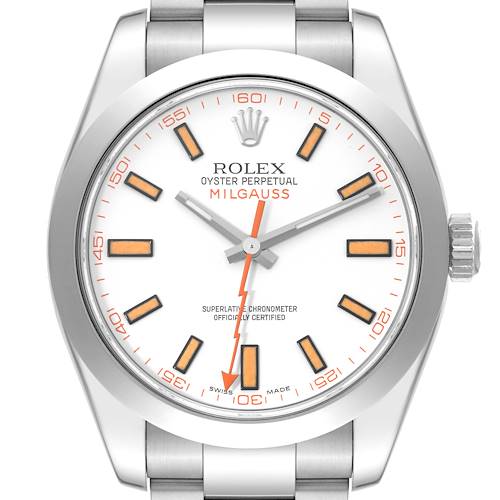- CALL US (404) 814-1814
- LIVE SUPPORT
- EMAIL US
-
WISHLIST (0)
-
CART(0)

Men's Milgauss | Watch Collection
8 MATCHES FOUND
Rolex Milgauss Collection
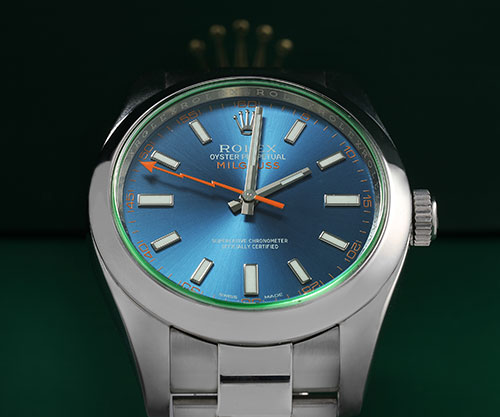
The Rolex Milgauss is a pioneering anti-magnetic watch. Designed to meet the needs of the scientific community, it can withstand magnetic fields of up to 1,000 gauss.
Introduced in 1954, the Milgauss was created amidst the post-war boom in technological industries. This period spawned a wide variety of novel electronic instruments, including high-tech appliances that emitted strong magnetic forces. These gadgets produced enough of a field to disrupt the timekeeping of traditional watches.
Like many of the Rolex models designed during this period – such as the GMT Master, Submariner, and the Day-Date – the Milgauss was designed to overcome an emerging problem of the 20th century. The Milgauss’ reason to be is to keep accurate time even in the presence of electromagnetic fields.
The current line of Rolex Milgauss watches not only carry its anti-magnetic positioning – they are also some of the most vivid and playfully designed watches in the Rolex line-up. Today, the sporty-elegant luxury watch is a top choice not just for scientists or engineers, but also for fashion-forward watch enthusiasts.
Explore our wide selection of Rolex Milgauss watches at SwissWatchExpo.com.
A BRIEF HISTORY OF THE ROLEX MILGAUSS COLLECTION
The years after the Second World War (1939 – 1945) saw major advances made in the fields of science, medicine, and engineering. This period gave rise to the invention of high-tech electronic equipment and laborsaving devices that, while solving everyday problems, also brought with them a new kind of problem: electromagnetic fields.
The delicate mechanisms inside a watch can be damaged by forces as low as 50-100 gauss, meaning even household appliances could affect their timekeeping abilities. Rolex’s solution was to house the movement inside a Faraday cage, which directed magnetism away from the caliber. The European Organization for Nuclear Research (CERN), the world’s most distinguished particle physics laboratory, tested the earliest models of this watch, and determined that it could resist magnetic fields up to 1,000 gauss. Named the Rolex Milgauss, it is a portmanteau of mille (French for thousand) and gauss (the unit of measurement for magnetism).
The first ever Rolex Milgauss model was made in 1954 with the ref 6543. This was more of a prototype with only around 150 units ever produced in a span of two years. Rolex instead cites the succeeding ref 6541 as the official start of the Milgauss collection, beginning in 1956.
Both references featured a black rotating bezel and a black matte dial with a metallic honeycomb pattern, which acted as a further magnetic shield. In addition, the second generation had one subtle design flourish: a lightning-bolt style seconds hand.
Despite having qualities useful to the wide spectrum of the watch buying public, the Milgauss didn’t flourish, just like the Omega Railmaster and the IWC Ingenieur – two anti-magnetic watches produced at around the same time.
In 1960, Rolex released the third generation of the Milgauss with the ref 1019, removing its tool watch features, and replacing it with a far more understated aesthetic. Its movement was also upgraded to the Caliber 1580, which increased the balance frequency from 18,000vph to 19,800vph, and introduced a hacking seconds function.
A special version of the ref 1019 was also created at the request of scientists at CERN. This watch featured no luminescence at all, as it was believed that even radioactive tritium lume would disrupt sensitive lab equipment.
The ref 1019 went unchanged for the next 28 years, until Rolex discontinued it in 1988. Many thought it would be the last of the Rolex Milgauss.
In 2007, Rolex surprised the watch community when it reintroduced the long-absent Milgauss. The launch was timed to coincide with the completion of CERN’s Large Hadron Collider, the world’s highest-energy particle accelerator.
The new Rolex Milgauss came in a modern design aligned with the sports watches of the day – in a 40mm case, and constructed in Oystersteel, Rolex’s take on the 904L alloy. It came in three versions – a black dial and a white dial, and third design with a black dial and a unique green sapphire crystal. All three designs feature orange accents and an orange lightning-bolt seconds hand. They also run on the Caliber 3131 movement, which features additional anti-magnetism elements such as the patented blue Parachrom hairspring.
In 2014, Rolex phased out the black model with the clear sapphire crystal, and introduced a new dial called the Z-Blue. In addition to having the green sapphire crystal, the Z-Blue comes with a unique electric blue sunburst finish with orange accents. In 2016, Rolex discontinued the white dial version of the 116400, leaving only the two green sapphire models in the brand’s current catalog.
Today, the Rolex Milgauss is considered a cult classic within the Rolex portfolio, sought after by watch enthusiasts who seek a watch out of the ordinary.
EVOLUTION OF THE ROLEX MILGAUSS
The Rolex Milgauss had a long hiatus between the 1980s to the mid 2000s, so there are only a few references from the collection. Despite that, the Milgauss has a rich history and unique styling that makes it an ideal watch to collect. Below is a complete list of Rolex Milgauss references manufactured by Rolex, and their distinct characteristics.
Ref 6543 (1954 – 1956)
Caliber: 1080
This is the prototype Rolex Milgauss produced in limited numbers. It had an appearance similar to the Rolex Submariner, with its 37.5mm stainless steel case, bidirectional bezel, both painted and applied indices, and the Caliber 1080 – a standard movement for Rolex at the time. What wasn’t standard was the honeycomb pattern on the dial, and the soft iron cage surrounding the movement, which protects it from outside magnetic fields. This was the same reference tested and certified by CERN as being resistant to magnetic fields of up to 1,000 gauss.
Ref 6541 (1956 – 1960)
Caliber: 1080
This reference is cited by Rolex as the start of the Milgauss collection. It had all the same qualities as the previous 6543, except for one unique feature: the lightning-bolt shaped seconds hand. Despite its unique features, it was not much of a success, so Rolex scrapped most of the design by 1960.
Ref 1019 (1960 – 1988)
Caliber: 1580
The third generation of the Rolex Milgauss still possessed the soft iron cage and anti-magnetic qualities of the previous version, but its outside appearance was changed. It now featured a 38mm steel Oyster case, and a simpler dial with baton hour markers, a traditional seconds hand, and without the honeycomb pattern.
A special version of this dial was created for the scientists at CERN, which had no luminescence, as even a small amount of radioactive material could skew results in the laboratory.
This reference was a staple of the Rolex catalog for 30 years, until it was discontinued in 1988.
Ref 116400 / 116400GV (2007 –)
Caliber: 3131
The Rolex Milgauss re-emerged in 2007 in a resolutely modern design. It boasted a larger 40mm Oystersteel case with a smooth bezel and a polished finish. There were three dial designs initially available: a black dial and a white dial with luminous baton hour markers, orange accents, and an orange lightning-bolt seconds hand. The third option had the same features, but was given a novel element: a green-tinted sapphire crystal.
Powering the new Milgauss watches was Rolex’s Calibre 3131, a COSC-chronometer certified movement which had the soft iron cage, but with added para-magnetic components for its balance hairspring.
In 2014, a new dial color was introduced, called the Z-Blue. The electric blue dial featured a sunburst finish. Paired with the green-tinted sapphire crystal and the orange accents, it continued the playful aesthetic of the modern Rolex Milgauss.
Today, only the green-tinted sapphire crystal models under ref 116400GV remain in Rolex’s catalog.
ROLEX MILGAUSS REFERENCE NUMBERS
The table below shows the list of Rolex Milgauss references through the years, from older 4-digit references to the modern 6-digit models.
| REFERENCE NUMBER / MODEL | PRODUCTION PERIOD | MOVEMENT |
| 6541 | 1954-1956 | Caliber 1080 |
| 6543 | 1956-1960 | Caliber 1080 |
| 1019 | 1960-1988 | Caliber 1580 |
| 116400 | 2007 - 2016 | Caliber 3131 |
| 116400 GV | 2007 - | Caliber 3131 |
COMMON QUESTIONS ABOUT THE ROLEX MILGAUSS
The Rolex Milgauss holds a special position in the brand’s catalog as its first anti-magnetic watch. Here are some of the most common questions asked about the Rolex Milgauss.
WHAT IS A ROLEX MILGAUSS?
The Rolex Milgauss is a collection of watches that can resist magnetic fields of up to 1,000 gauss. Its anti-magnetic capabilities also explains its name – mille is the French word for thousand, and the the unit of measurement for magnetism is gauss.
HOW WILL I KNOW IF MY ROLEX MILGAUSS IS GENUINE?
Rolex watches are made using the finest materials and are crafted to absolute perfection, to guarantee its performance, durability, and aesthetics.
Closely inspect the body of the watch –particularly the case, dial, crown, hands, bezel, bracelet, and clasp – if any element comes across as sub-par quality, then it is likely a counterfeit.
The Rolex Milgauss has a sporadic history, so what to look for when authenticating the watch will differ between vintage and modern models. It is always advisable to do research beforehand, so you can check if the details of the watch are aligned with your chosen model’s supposed features.
Lastly, the easiest way to avoid counterfeit watches is to “buy the seller”. Purchase only from a reputable and trusted dealer, who can provide a guarantee of authenticity on their watches.
HAS ROLEX DISCONTINUED THE MILGAUSS?
Rolex continues to produce the 116400 GV or glace verte models with the tinted green sapphire crystal. It comes with a choice of black and Z-blue colored dials. The non-GV ref 116400 models are still available in the pre-owned market, and are highly sought after among watch fans who seek a Rolex with a “wow” factor.


